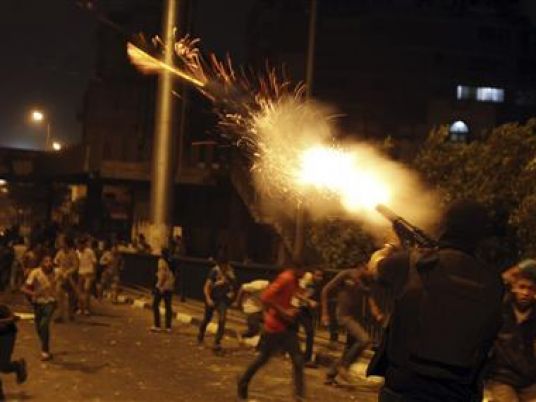
At least 33 people were killed during protests in Egypt on Sunday, the interior ministry said, as the crisis since the army seized power three months ago showed no sign of abating.
Fighting began after supporters and opponents of deposed Egyptian President Mohamed Morsy of the Muslim Brotherhood took to the streets in several cities.
At Ibn Sina hospital in the Mohandiseen district of Cairo, a Reuters reporter saw eight bodies shrouded in blue and white sheets among pools of blood.
“The interior ministry and the army killed my son,” screamed Sabah el-Sayed, mother of Rami Imam, 29, stroking his leg. Imam’s father said his son had been heading home from work when he got caught up in the clashes.
Abdelrahman al-Tantawi, a medic who brought Imam to the hospital, said he had seen police and army firing from a bridge at pro-Brotherhood demonstrators.
He said Imam had a bullet wound in his back. Reuters could not independently verify that account of events.
Authorities had warned on Saturday that anyone who protested against the army during ceremonies marking the anniversary of an attack on Israeli forces during the 1973 war would be regarded as an agent of foreign powers, not an activist.
The interior ministry described the clashes as an attempt by the Muslim Brotherhood to “ruin the celebrations and cause friction with the masses”.
It said in a statement 30 of the 33 dead had been killed in the Cairo and Giza governorates and 423 people had been arrested. Scores of people were reported wounded.
Protesters had been heading towards Tahrir Square, the rallying point for the popular uprising that toppled autocrat Hosni Mubarak in 2011, security sources said.
The military often accuses the Brotherhood of inciting violence during protests, accusations it denies.
The state news agency reported that during clashes in the Nile Delta province of Qulubiya, authorities arrested 25 members of the Brotherhood who had 51 hand grenades.
The Brotherhood says it is opposed to the violent methods of other Islamist groups. Attacks by militants on police and soldiers in the Sinai Peninsula have increased sharply since Morsy was toppled.
INSURGENCY
Fears are growing that an Islamist insurgency will take hold outside Sinai in other parts of Egypt. A Sinai-based militant group inspired by al Qaeda said it tried to kill the interior minister in a suicide bombing in Cairo last month.
A Muslim Brotherhood member was killed and at least two were wounded when marchers clashed with police in the town of Delga, 300 km (190 miles) south of Cairo, security and medical sources said.
Protesters chanted “The coup is terrorism” and “Sisi is a killer", referring to army chief General Abdel Fattah al-Sisi.
The Brotherhood’s political wing, the Freedom and Justice Party, said it held Sisi and the Interior Ministry responsible for Sunday’s deaths.
“We call on all human rights organizations to condemn the crimes committed today. We call for an international investigation into the crimes of today," it said in a statement.
Cairo’s Dokki district was littered with rocks and thick with tear gas. Security forces fired in the air in the capital and Egypt’s second city Alexandria, witnesses said.
Thousands of members of the Brotherhood, which was recently banned, reached within five city blocks of Tahrir Square – the rallying point for protesters during the revolt that toppled autocrat Hosni Mubarak in 2011.
AIRCRAFT OVERHEAD
Police fired tear gas and beat protesters to keep them away from the square, where people were gathering for the celebrations to commemorate the 1973 fighting.
Fighter jets roared overhead and military helicopters trailed Egyptian flags, as they did during the unrest that led to Morsy’s overthrow.
State television aired a ceremony at Cairo’s air defense stadium which interim President Adly Mansour and Sisi attended.
The Muslim Brotherhood, Egypt’s oldest and most influential Islamist group, has demonstrated repeatedly against the army’s overthrow of Morsy.
On Sunday state television broadcast live footage from Tahrir Square and Alexandria showing crowds waving Egyptian flags and carrying photographs of Sisi.
Sisi has promised a political road map would bring free and fair elections and stability to Egypt. The Muslim Brotherhood has rejected the political transition plan, saying the army-backed government installed by Sisi is illegitimate.
The Brotherhood won every election after Mubarak’s fall but became unpopular during Morsy’s rule, with many Egyptians accusing him of trying to acquire sweeping powers and mismanaging the economy. He denies the accusations.
The Brotherhood accuses the army of sabotaging democracy by ousting Morsy, the first freely-elected president in Egypt, a key US ally which has a peace treaty with Israel and controls the Suez Canal, a vital global trade route.
The military says it was following the will of the people.
On 14 August, the military-backed authorities smashed two pro-Morsy sit-ins in Cairo, with hundreds of deaths, and then declared a state of emergency and imposed a curfew. Many of the Brotherhood’s leaders have been arrested since.
Egyptian authorities have tightened security around the country since clashes killed at least four people on Friday, when Morsy’s supporters mounted their boldest demonstrations since troops crushed their protest camps.




